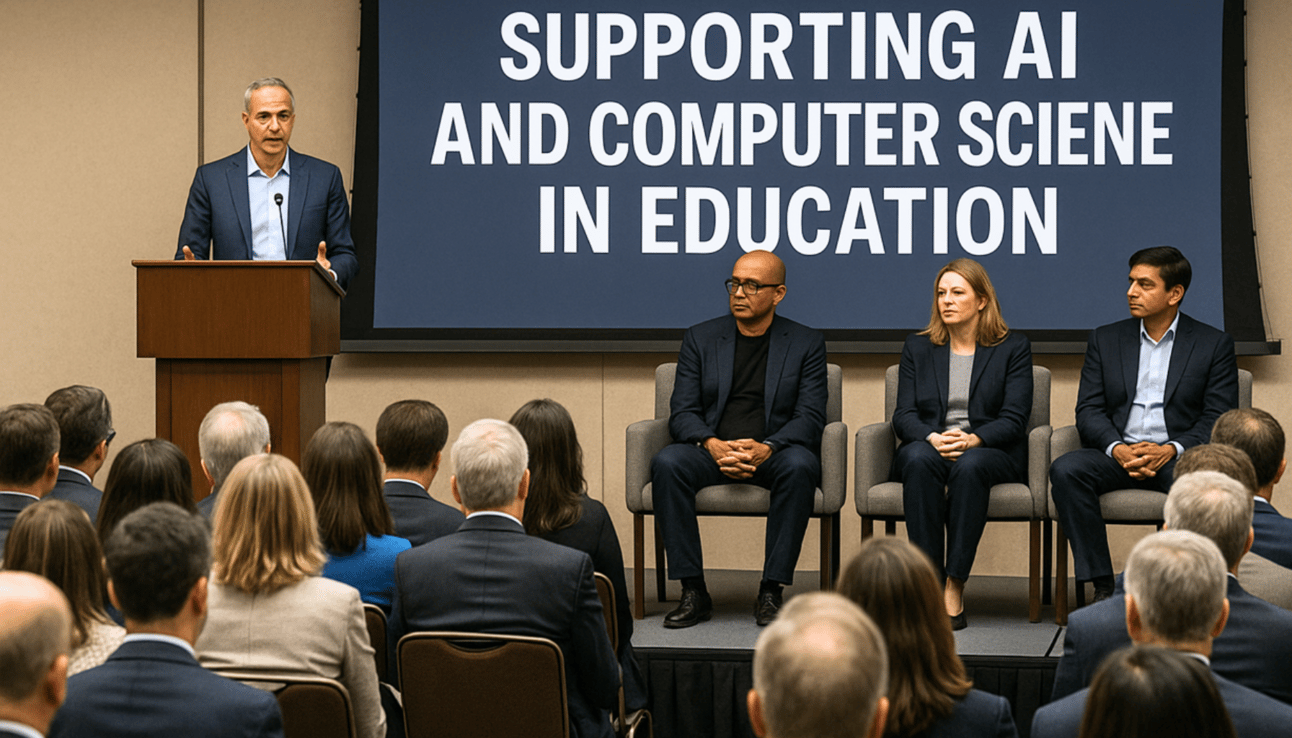
Image Source: ChatGPT-4o
Over 250 CEOs Urge Schools to Make AI and Computer Science Core Subjects
More than 250 corporate leaders have signed an open letter urging U.S. schools to make artificial intelligence and computer science core components of K-12 education. The letter, published Monday in The New York Times, argues that America risks falling behind globally if it does not act now to better prepare students for a technology-driven future.
The signatories include high-profile executives such as Microsoft CEO Satya Nadella, Etsy CEO Josh Silverman, and Uber CEO Dara Khosrowshahi. Together, they describe a widening skills gap and say computer science education is critical to “keeping America competitive.”
“Countries like Brazil, China, [South] Korea, and Singapore have already made computer science or AI mandatory for every student,” the letter states. “The United States is falling behind. In the age of AI, we must prepare our children for the future — to be AI creators, not just consumers.”
Economic Potential and Educational Inequity
The letter echoes messaging from CS for All, a nonprofit leading the push for nationwide computer science education. The organization argues that a single high school course in computer science can boost students’ wages by 8%, regardless of whether they pursue a career in tech or go on to college.
Yet despite the potential benefits, the group notes that only 12 states currently require any form of computer science for graduation. As a result, most students never have the opportunity to explore the subject at all.
“This is not just an educational issue,” the letter continues. “It’s about closing skills and income gaps that have persisted for generations.”
According to CS for All, making AI and computer science universally available could unlock an estimated $660 billion in economic potential each year. They frame the issue as one of economic justice as well as national competitiveness.
A Call to Action Amid Federal Policy Shifts
The timing of the letter aligns with recent activity from the Trump administration, which has begun drafting new U.S. AI policy. Last week, President Trump signed an executive order promoting AI integration across education and the workforce through new partnerships between industry and academia.
Supporters of the open letter describe the broader movement as bipartisan, citing advances over the past decade. All 50 states have taken steps to expand computer science education, and more than 100,000 teachers have begun teaching the subject in schools.
Still, advocates say much more is needed. The letter calls on policymakers to take the next step by making AI and computer science mandatory across the country.
“We owe it to [our children] to provide an education that reflects the demands of our time,” the letter states. “Together, we can unlock $660 billion in opportunity for everyday Americans, close wage gaps, and ensure our children are prepared for the challenges and opportunities of tomorrow.”
Over 750 individuals have already signed the letter, and the campaign continues to gather support through CS for All’s website.
What This Means
The open letter signals growing urgency among business leaders to integrate AI and computer science into public education—not as electives or enrichment, but as foundational skills. As technologies like automation and machine learning continue to transform industries, many companies say the U.S. education system is not keeping pace with the demands of the modern workforce.
The CEOs backing this effort represent sectors ranging from software and e-commerce to transportation and finance, underscoring that AI literacy is no longer limited to the tech world. Their call to action reflects a broader shift: jobs in manufacturing, healthcare, logistics, and customer service are increasingly shaped by algorithms, data, and digital tools. Without a baseline understanding of these technologies, future workers may be shut out of entire segments of the economy.
For schools, this means rethinking graduation requirements, curriculum standards, and teacher training. For policymakers, it raises questions about funding, equity, and access—especially in underserved districts where technology resources are limited. Advocates argue that prioritizing computer science education could help bridge long-standing economic divides by giving all students—not just those in well-resourced schools—a pathway to higher-paying careers.
As AI continues to redefine what skills are essential, the conversation around education is shifting from if these subjects should be taught to how soon and how universally they can be implemented.
Preparing every student to understand and shape the technologies driving our world isn’t just smart policy—it’s a shared obligation for a future-ready society.
Editor’s Note: This article was created by Alicia Shapiro, CMO of AiNews.com, with writing, image, and idea-generation support from ChatGPT, an AI assistant. However, the final perspective and editorial choices are solely Alicia Shapiro’s. Special thanks to ChatGPT for assistance with research and editorial support in crafting this article.
